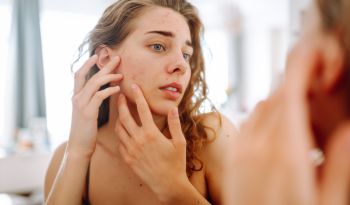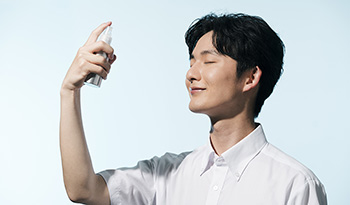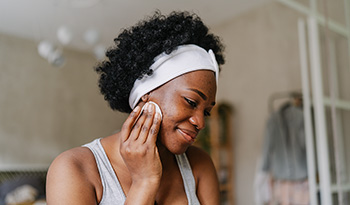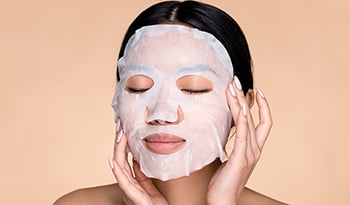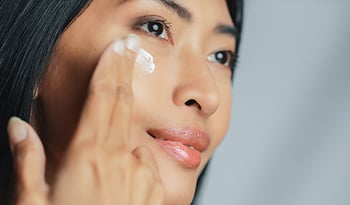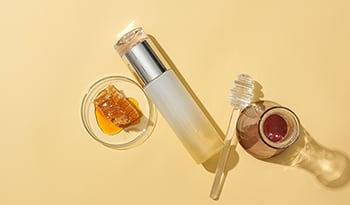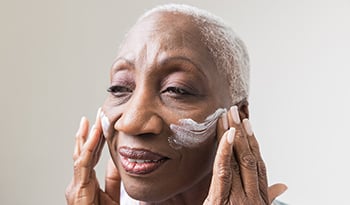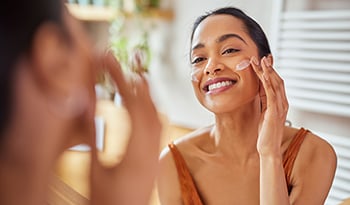Sådan bruges Retinol Serum til de bedste resultater
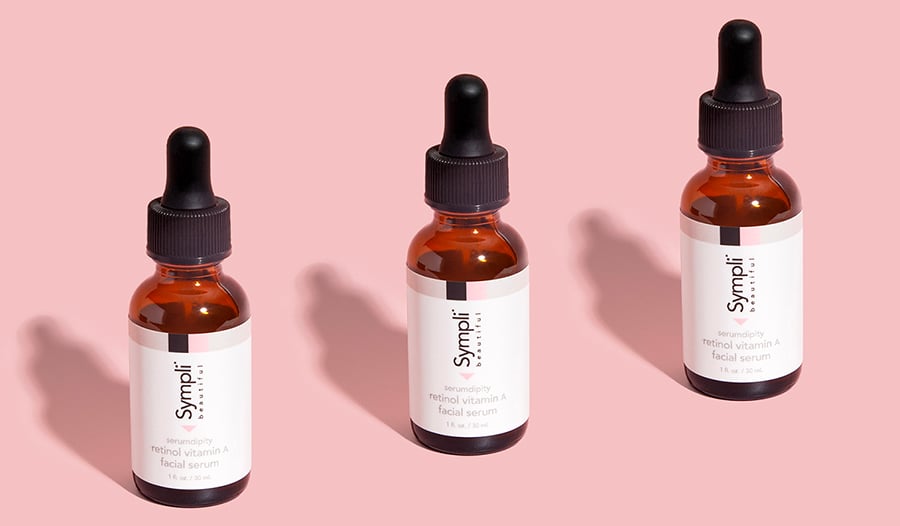
Er det fine linjer, der genererer dig? Leder du efter fyldig, mere smidig hud? Hvis disse spørgsmål resonerer med dig, kan retinolserum være det svar, du har søgt efter.
Hvad er Retinol?
Retinol er en naturlig form for vitamin A og en type retinoid. Retinolserum stammer fra både planter og dyr og kan fremstilles af oksekød, kylling eller fiskelever, gulerødder, søde kartofler og andre kilder. Selvom retinol er et naturligt stof, anvendes kommercielt retinolserum typisk i laboratoriemiljøer. Dette sikrer ensartet kvalitet og stabilitet af det syntetiske molekyle, der efterligner retinols naturlige molekylære struktur.
Fordele ved retinol serum
Retinol er fantastisk til lysning af huden, pH-balancering og anti-aging fordele. Det bruges også til en række hudsygdomme, herunder:
- Fine linjer
- Rynker
- Ryddig hudstruktur
- Mild acne
- Solbriller
- Mørke pletter
Retinolserum er effektivt til en række hudsygdomme på grund af dets evne til at neutralisere frie radikaler i det dermale (eller midterste) lag af huden. Derfor øges kollagen, og elastinproduktionen øges, mens skader fra solen reduceres.
Retinol hjælper med at regulere hudcelleomsætningen og forbedrer udseendet af hudfarve og tekstur. Ved at genopbygge huden og fremskynde nye hudceller til at komme til overfladen hjælper retinol med at fjerne døde hudceller, kedelig hud og tilstoppede porer.
Retinols hudforstærkende virkninger giver huden et generelt forbedret udseende. En omhyggeligt udformet stabiliseret retinolformel berigeret med hyaluronsyrekompleks, C-vitamin, E-vitamin og jojobaolie til uovertruffen hydrering, anti-aging og omfattende hudpleje er ideel til optimale hudlysningsresultater.
Retinolcremer vs. Retinolserum
Retinolcreme er faktisk forskellig fra retinolserum. Retinolcremer kan være mere ideelle til tør, følsom hud og tilbyder en blid, fugtgivende mulighed. Retinolserum er ideelt til at målrette mod mere avancerede hudproblemer såsom hyperpigmentering og dybe rynker. Ved at give højere koncentrationer af den aktive ingrediens giver serum en mere kraftfuld punch. De kan dog være mere irriterende for huden.
Se efter disse nøgleingredienser i dit retinolprodukt for at få de bedste resultater:
- Stabiliseret retinol
- Hyaluronsyrekompleks
- C-vitamin
- Naturlig form af E-vitamin
- Jojoba
- Ester
- Natriumascorbat
Sørg for, at produktet er frit for:
- Alle almindelige allergener
- Dufte
- Olier
- Parabener
- Silikoner
- Sulfater
Tips til brug af retinolserum
Hvis du har besluttet, at retinol er en god løsning på dine hudproblemer, er her et par tips, der kan hjælpe dig med at få de bedste resultater fra din retinolrutine.
Daglig brug
Det er bedst at bruge retinolserum dagligt og mere specifikt om natten. Eksponering for lys og luft kan deaktivere nogle retinoltyper. For de bedste resultater skal du bruge serum dagligt. Men hvis du oplever uønskede bivirkninger som tørhed eller rødme, kan du reducere dit forbrug til hver anden dag.
Start ung
Forebyggelse er bedre end helbredelse. Begynd at bruge retinolserum i midten af 20'erne til midten af 30'erne for optimale resultater. Det er aldrig for sent at begynde at implementere et retinolserum i din hudplejerutine. Nogle vil måske endda starte tidligere i midten af 20'erne, hvis teenageracne er et problem. At starte en retinolrutin i 20'erne og 30'erne kan hjælpe med at forhindre fine linjer og solpletter. For at tackle rynker, solpletter og andre tegn på din alderdom i 40'erne og derover, kan du også begynde at bruge serum.
Overdrive det ikke
Hvis det bruges ofte, eller hvis formuleringen er for stærk for din hud, kan retinolserum være irriterende og forårsage rødme, tørhed, skrælning eller afskalning. Start lavt og gå langsomt. Begynd med en ærlighed på en lav dosis (0,01-0,03 procent) to gange om ugen. Øg derefter din brug langsomt for at give din hud tid til at akklimatisere sig.
Undgå at anvende retinolserum dagen før du eksfolierer din hud. Retinolbrug i forbindelse med peeling kan forårsage mere irritation og hudfølsomhed. Andre behandlinger for at undgå retinolanvendelse inkluderer mikronbehandling, laserbehandling og mikrodermabrasion.
Andre tilfælde, hvor retinol bør undgås, omfatter ferier i solen eller perioder, hvor længere tid i solen kan forventes.
Retinol kan være for potent til dem med acne rosacea, eksem eller meget følsom hud. Plantebaserede alternativer kunne være en bedre mulighed.
Prøv Skin Cycling
Hudcykling er en teknik, der skifter din hudplejerutine mellem eksfolierende midler. Formålet med cykling er at reducere risikoen for, at din hud bliver rød, tør og overeksfolieret.
Følg disse trin for at starte din hudcykelrutine.
- Nat 1: Brug en eksfoliator.
- Nat 2: Påfør et retinolserum eller creme.
- Nætter 3 og 4: Brug kun fugtgivende, beroligende og styrkende hudprodukter til en restaurerings- og restitutionsperiode.
Helkropspleje
Andre dele af din krop kan have retinolprodukter. Du kan anvende retinolserum på dit nakkeområde, som ofte viser tegn på aldring. Hvis din hals virker følsom over for dit ansigtsserum, kan du prøve et produkt, der er specielt lavet til decolletageområdet eller et med en lavere retinolprocent med yderligere beroligende midler.
Der er nogle interne retinoider såsom Isotretinoin (Accutane), der bruges til at behandle alvorlige tilfælde af acne. Der er også retinsyre (Tretinoin), den mest foreskrevne retinoid, der er rettet mod både acne og tegn på aldring.
For denne artikel er receptfri version af retinoider (retinoler) i fokus. De er mindre irriterende end ordinerede retinoider og bruges til at forbedre hudens struktur, pigment, tone, fine linjer, solpletter, acne og mere.
Vær konsekvent
For de bedste resultater skal du være i overensstemmelse med din retinolapplikationsrutine. Uanset om du bruger det hver nat eller kun to gange om ugen, skal du være konsekvent med din praksis. Regelmæssig anvendelse over tid er det, du har brug for for at opnå optimale resultater med retinolserum.
Trin-for-trin retinolrutine
- Udfør følgende trin om natten for at få de bedste resultater. Mens retinol ikke reagerer med sollys for at forårsage forbrændinger, hvilket betyder, at det ikke er fototoksisk, nedbrydes mange retinolprodukter i solen. Derfor kan anvendelse af retinol om morgenen gøre det mindre effektivt.
- Rengør: Brug et blidt rengøringsmiddel og hold huden tør. Brug ikke slibende rengøringsmidler eller gnid din hud for hårdt.
- Påfør en mængde retinolserum på størrelse med ærmer i et tyndt lag over hele dit ansigtsoverflade ved hjælp af kvadratsystemet. Fordel mængden jævnt mellem panden, både børn og have.
- Undgå at få serum ind i følsomme områder som næse, øjne og mund.
- Gnid retinolen ind i din hud, indtil den ikke længere er synlig.
- Hvis du bruger en creme eller en lotion, skal en pumpe eller mængden af størrelse med fingerspidsen være tilstrækkelig.
- Vent 10-30 minutter på, at retinolen absorberes fuldt ud.
- Anvend et tyndt lag af fugtighedscreme.
- Om morgenen skal du vaske dit ansigt grundigt, men alligevel forsigtigt, og påfør dagligt en bredspektret SPF 30 eller højere solcreme på dit ansigt.
- Hvis du oplever tørhed, rødme eller afskalning, skal du undgå daglig brug. Prøv at bruge det i 2-3 nætter om ugen for at reducere risikoen for uønskede bivirkninger.
Retinol bivirkninger
Selvomretinol giver flere fordele for din hud, er der mulighed for uønskede bivirkninger. Her er et par af de mest almindelige bivirkninger.
- Solfølsomhed: Da retinol kan gøre din hud mere følsom over for sollys og kan nedbrydes i UV-lys, er det vigtigt at anvende retinolprodukter om natten og bære solcreme i løbet af dagen.
- Tør hud: Retinol kan få din hud til at blive for tør. At forblive hydreret og bruge en fugtighedscreme efter påføring hjælper med at mindske tørheden. Tørhed kan være værre i de første uger af retinolbrug og vil sandsynligvis blive bedre over tid.
- Smerter: Typisk mild i naturen vil symptomer forbundet med retinolbrug typisk forbedres med tiden.
- Rødme: Retinol kan forårsage rødme i huden på grund af irritation. Ligesom andre symptomer vil rødme være mest almindelige ved første brug og have tendens til at blive bedre med fortsat, konsekvent anvendelse.
- Afskalering og skrælning: Typisk en bivirkning for dem, der implementerer en ny retinolrutin, bør dette forbedres over tid.
- Stramhed: Efter påføring af retinol kan din hud føles lidt stram. Anvendelse af fugtighedscreme efter retinolpåføring skal hjælpe med at lindre denne fornemmelse.
- Interne retinoider, såsom Accutane, kan forårsage mere alvorlige bivirkninger såsom fødselsdefekter, alvorlige hudreaktioner, tarmproblemer, højt kolesteroltal, leverskade og sjældent øget hjernesygdom, der kan føre til synstab eller død.
Det store billede
Retinol serum er formuleret til at tackle mange hudproblemer. Fra solpletter og acne til fine linjer og ren hudtekstur kan topisk retinolserum både behandle og forhindre disse almindelige hudtilstande.
For optimale resultater skal du sørge for at være i overensstemmelse med din retinolrutine. Sørg for ikke at overdrive det med hyppig anvendelse eller kraftige produkter til din hud.
Husk at anvende retinol om natten for at minimere hudens følsomhed over for solen og for at bevare stabiliteten af dit produkt. Vær opmærksom på almindelige bivirkninger af retinolserum, herunder rødme, tæthed, tørhed, afskalning, skrælning, kløe og solfølsomhed. Størstedelen af disse symptomer forsvinder ved konsekvent, fortsat brug af den rette styrke, der passer til din hudtype.
Rådfør dig altid med din læge, før du bruger retinoider, herunder retinol, i din hudplejerutine.
Referencer:
- Zasada, M., Budzisz, E., & Erkiert-Polguj, A. (2020). En klinisk sammenlignende undersøgelse mod ældning af 0,3 og 0,5% retinolserum: Et klinisk kontrolleret forsøg. Hudfarmakologi og fysiologi, 33 (2), 102—116.
- Spierings NMK (2021). Bevis for effektiviteten af over-the-counter vitamin A-kosmetiske produkter til forbedring af ældning af ansigtshuden: En systematisk gennemgang. Tidsskriftet for klinisk og æstetisk dermatologi, 14 (9), 33—40.
- Zasada, M. og Budzisz, E. (2019). Retinoider: aktive molekyler, der påvirker dannelsen af hudstruktur i kosmetiske og dermatologiske behandlinger. Postepy dermatologi og allergologi, 36 (4), 392—397.
- Milosheska, D. og Roškar, R. (2022). Anvendelse af retinoider i topiske antialdringsbehandlinger: En fokuseret gennemgang af klinisk evidens for konventionelle og nanoformuleringer. Fremskridt inden for terapi, 39 (12), 5351—5375.
- Motamedi, M., Chehade, A., Sanghera, R., & Grewal, P. (2022). En klinisk vejledning til aktuelle retinoider. Tidsskrift for kutan medicin og kirurgi, 26 (1), 71—78.
- Quan T. (2023). Aldring af menneskelig hud og anti-aldringsegenskaber ved retinol. Biomolekyler, 13 (11), 1614.
ANSVARSFRASKRIVELSE: Wellness Hub har ikke til hensigt at stille diagnoser...

















































































 Indholdsfortegnelse
Indholdsfortegnelse



